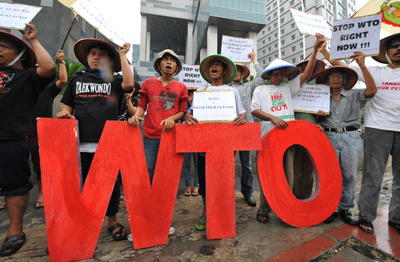If Doha is indeed all about agriculture, then not much will have been lost from a producer’s perspective, given current world food prices. And we will still have the WTO rules (dispute settlement mechanism and enforcement) though vastly weakened because of damage to the institution of a failed Round. But if Doha can’t do agriculture, then it surely can’t do behind-the-border reform. And the multilateral system will be further weakened with countries chasing more free trade agreements (FTAs).
The EAF this week features a series of essays on Doha led by Richard Baldwin and Simon Evernett who warn that ‘2011 is a fork in history’s road’ and that ‘if the US and China are unwilling to break the deadlock in 2011, no deal is likely before 2020’.
That matters. A failed Doha ‘would damage the multilateral system in an era when multilateral cooperation is in short supply’ as Peter Drysdale says. Drysdale goes on to argue that it is important since ‘The multilateral trading system is the economic sinew that constrains the exercise of international political muscle in ways that damages global wellbeing and inflicts national self-harm.’
The lack of progress on Doha signals a retreat from the days when international economic diplomacy helped diplomacy on other fronts — especially security. That does not bode well for relations between countries (read China and the United States) with different political systems that would tend towards conflict rather than cooperation without the positive sum economic diplomacy underlying the zero or negative sum security dialogues and interactions.
Ed Gresser explains that Doha is an example of a larger international system problem. Put bluntly, it is an example of the US being prepared to do a deal with anyone but China. We see the signs of this with the Trans-Pacific Partnership (TPP) agreement too with the United States making sign-on by China close to impossible.
What then, of progress with trade reform?
Making progress on trade reform (and economic reform more generally), will not be delivered in trade negotiating forums. As Krugman says, the case for free trade is primarily unilateral. And political will must be urgently mobilised at home.
What’s needed now (from both optimists and pessimists on the Round) is to keep ripping the fig leaf off current efforts at economic diplomacy. Doha is becoming a joke because, as Sourabh Gupta explains, the US keeps shifting the goal posts, with its take-it-or-leave-it diplomacy designed to ensure ‘anyone but China’ outcomes. FTAs are a joke because they are with nations that don’t matter in the total scheme of global trade and are designed by the powerful to exclude anything that matters or brings real gains. It’s hard to see how such FTAs could create a serious domino effect that is likely to bring in the other big players, as some still argue. If FTAs were about trade and economics, the United States would be negotiating with China and a Japan-China FTA would be on the table as well. So current economic diplomacy has become empty of content.
The world does not yet have a plan B. And losing all that has been gained in the 10 years of negotiating Doha is a monumental waste. What gains have been achieved should be locked in with a take-what-there-is deal because there is enough there and it is critical not to weaken the whole system at this juncture.
Leaders ‘should argue that Doha needs to be done to preserve one of the world’s most precious public good – the rules-based, WTO-centric trade system’. ‘It is a system’, as Baldwin and Evenett remind us, ‘that has created so much prosperity in America and lifted so many people out of poverty in China, India and Brazil’ that’s worth saving.
And while further actual trade and behind-the-border reform will now require mostly unilateral effort, a Plan B on economic diplomacy is vital because of the implications for security.
Philippa Dee is Adjunct Associate Professor at the Crawford School of Economics and Government at the ANU and Shiro Armstrong is currently a Visiting Fellow at Columbia University and Editor of the EAF.


If we have a global government tasked to ensure the best global benefits from trade, then Doha round would be easily resolved. But we have national governments with their national interests. Why a national government should prioritize global interest over its own?
So, a successful model of a multilateral round must maximize each individual government’s outcome and global outcome in the second place. A function to maximize the value of 153 variables. Why everyone is sure that a solution exists and exists right now?